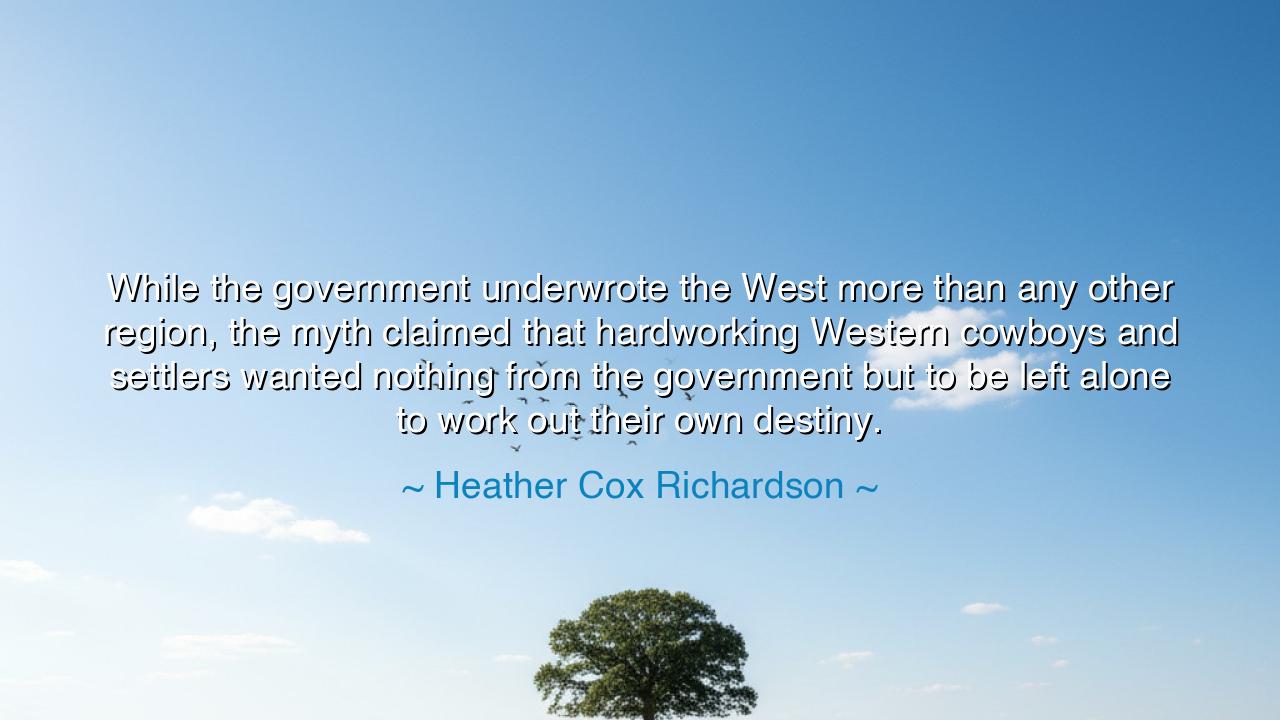
While the government underwrote the West more than any other
While the government underwrote the West more than any other region, the myth claimed that hardworking Western cowboys and settlers wanted nothing from the government but to be left alone to work out their own destiny.






In the penetrating words of Heather Cox Richardson, historian of the American Republic, she wrote: “While the government underwrote the West more than any other region, the myth claimed that hardworking Western cowboys and settlers wanted nothing from the government but to be left alone to work out their own destiny.” This statement strikes at the heart of one of America’s most enduring illusions — the myth of rugged individualism. Richardson, whose work lays bare the hidden machinery of history, reminds us that what we often remember as a tale of self-reliance was, in truth, a story woven with the threads of collective support, public investment, and federal power. The West, that vast frontier of imagination and legend, was not conquered by lone heroes, but by the unseen hand of government aid.
When she says the government “underwrote the West,” she speaks of the railroads, the land grants, the irrigation projects, and the military campaigns that made the frontier habitable for settlers. Millions of acres were given freely to railroad companies; vast funds were poured into building the arteries of commerce that would carry cattle, wheat, and minerals to the coasts. The Homestead Act offered land to thousands, not through private struggle but through public policy. And yet, even as the settlers tilled government soil and drank from government dams, a myth was born — that of the self-made pioneer, the man who needed no one, who owed his success to no institution but his own courage and toil.
That myth became the cornerstone of American identity. The cowboy, the frontiersman, and the homesteader were elevated as symbols of independence, defiance, and masculine virtue. But as Richardson shows, it was a story written to conceal the truth — that power and privilege were sustained not by isolation, but by collective effort. The government not only financed expansion; it also displaced the Native nations who had lived upon those lands for centuries, paving the way for settlers to claim territory already occupied. Thus, the myth of independence was built upon invisible dependence — the freedom of one group bought at the expense of another’s suffering.
Consider the example of the Transcontinental Railroad, completed in 1869. It is remembered as a triumph of grit and progress, but its success was forged through government subsidies, land grants, and the labor of immigrants who were exploited and forgotten. Chinese workers carved through mountains and deserts for meager pay, while corporate magnates grew rich on federal contracts. The story told to the public, however, was one of heroic enterprise — the West won by bold men with shovels and dreams. Thus, myth eclipsed memory, and the truth of shared endeavor was buried beneath the legend of solitary glory.
This is the power and danger of myth: it shapes how a people understand themselves. When a nation teaches its children that success is born of isolation, it forgets that community is the true engine of progress. Richardson’s warning is not merely historical — it is moral. The same story that once justified conquest and inequality continues to echo in modern times, when men still boast that they ask nothing from society while standing upon roads, systems, and institutions built by countless unseen hands. The myth of the West survives in every claim of self-made success that refuses to honor the foundation upon which it stands.
The wisdom of Richardson’s words is that truth is not diminished by recognizing interdependence. To admit that we are helped does not make us weak; it makes us honest. The settlers were brave, but their bravery was sustained by a nation’s commitment; their dreams were possible because of shared investment. True strength lies not in pretending to stand alone, but in acknowledging that we rise together. The greatness of a people is not found in their myths of isolation, but in their capacity for cooperation and gratitude.
So let this be the teaching: honor the truth behind the legend. When you hear tales of the self-made man or the solitary hero, remember the hands that built the bridges beneath his feet. Remember the workers, the laborers, the taxpayers, and the dreamers who formed the unseen network of support. Do not let the myth of independence blind you to the miracle of interdependence. For as history shows, no nation, no people, no man ever truly “worked out his destiny alone.”
Thus, the voice of Heather Cox Richardson calls to us like a prophet from the pages of time: the myth of the West was never about solitude — it was about solidarity disguised as strength. And only when we uncover that truth can we reclaim the nobility of unity that built a nation out of wilderness, not through isolation, but through shared endeavor.






AAdministratorAdministrator
Welcome, honored guests. Please leave a comment, we will respond soon